
 Ocmulgee Mounds National Historical Park (formerly Ocmulgee National Monument) in central Georgia was established in 1936 to protect the site of several large mounds built by the Mississippian people around 1000 years ago. The site is home to eight mounds of various shapes and sizes as well as a Civil War Battlefield, the battle of Dunlap Farm.
Ocmulgee Mounds National Historical Park (formerly Ocmulgee National Monument) in central Georgia was established in 1936 to protect the site of several large mounds built by the Mississippian people around 1000 years ago. The site is home to eight mounds of various shapes and sizes as well as a Civil War Battlefield, the battle of Dunlap Farm.
Visitor Rating (write your own review below)
Nice place for a walk and some history
ILNP Park Review
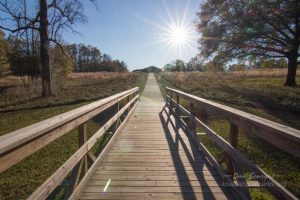
The Earthlodge (center background) is the highlight of the park and is reached via a walk from the Visitor Center across this bridge
Our Weather. Clear skies and 60s.
Our Visit. I visited Ocmulgee Mounds National Historical Park in December while on a trip to nearby Warner Robins, GA. At the time, it was still known as Ocmulgee National Monument.
Overall Impression. Ocmulgee isn’t a flashy park, but it’s a peaceful respite full of interesting history near downtown Macon, Georgia. Because of its seclusion amidst the suburban landscape, it’s a great place to get away for an uncrowded walk in the woods. While you’re walking, you get to climb on top of, and into, some ancient mounds and imagine what this area would have been like as part of a thriving Native American village.
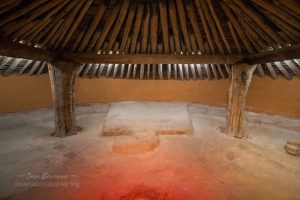
This is the original 1000 year old floor and reconstructed roof of the Earthlodge. It’s behind glass, but the trek through the narrow tunnel is worth it.
Visiting. The minimum time required to visit Ocmulgee Mounds is about 30 minutes. This is just enough time for a quick walk through the museum in the Visitors Center and a brief hike out to the Earthlodge mound. The museum is small but full of great information, models and artifacts. This area was home to different groups of natives, but the mounds were built by the Mississippian people around 900-1000 AD. The Earthlodge mound is really the highlight of the park because you can hike down into it and view its restored central chamber. The passageway is very narrow, and it gets shorter the further you go, so don’t enter unless you’re limber and don’t mind bending over–you can stand up at the end.
A better visit requires about 60 minutes. Start off with the Visitors Center and Earthlodge, but continue hiking (or get back in your car and drive) to the Greater Temple Mound. This is the highest mound in the area, and a set of stairs allows you to enjoy the view from the top. If you hike, you’ll go past the site of the 1700s trading post which is worth a quick stop along the way. If you have extra time, continue the hike or drive to the Funeral Mound for a good view of the Temple Mounds or take the River Trail or Opelofa Trail from the Greater Temple Mound into the Walnut Creek Wetlands where you might spot some river otters.
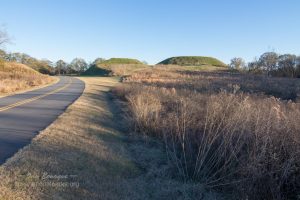
The Small and Large Temple Mounds as seen from the Funeral Mound. The road was built on top of an old railroad grade that was cut through a portion of the mounds in the 1800s
With 2-3 hours, you can explore some of the more obscure areas of the park like the Southeast Mound, Dunlap Mound, Civil War earthworks, or the remote McDougal Mound. Each site is unique and served a unique purpose within the Mississippian village, and signs along the way to a good job explaining what is known about the sites.
Suggestions. Walking is a big part of visiting Ocmulgee Mounds, so bring comfortable shoes. I went just before sunset and found the deep shadows and low light added to the experience and made the shape of the mounds more distinct, especially in pictures.
Nearby Towns Macon, Atlanta (GA)
Other Nearby Attractions Robins Air Force Base Museum of Aviation
Official NPS Website Ocmulgee Mounds National Historical Park
- The Visitor Center has a small but well done museum that explains the site and the native culture and displays artifacts found in excavations
- The Earthlodge (center background) is the highlight of the park and is reached via a walk from the Visitor Center across this bridge
- Cornfield Mound is a small mound that can be seen from Earthlodge. Its purpose isn’t entirely known
- A passageway leads into the Earthlodge. It’s narrow and short, but it opens up at the end
- This is the original 1000 year old floor and reconstructed roof of the Earthlodge. It’s behind glass, but the trek through the narrow tunnel is worth it.
- The hike from Earthlodge to the Temple Mounds crosses the Norfolk Southern Railroad via this footbridge. The railroad was cut and re-cut through this area long before it was preserved as a monument
- Between the Earthlodge and Temple Mounds lies the site of a 1700s trading post for the British and Creek Indians.
- The Large Temple Mound can be climbed via a set of stairs
- This is the view from the top of the Large Temple Mound looking northwest toward the Funeral Mound
- The southeast side of the park is home to the Walnut Creek Wetlands, seen here from the top of the Large Temple Mound
- The Funeral Mound is at the end of the road. It can’t be accessed, but the site offers a great view of the larger Temple Mounds
- The Small and Large Temple Mounds as seen from the Funeral Mound. The road was built on top of an old railroad grade that was cut through a portion of the mounds in the 1800s
Write Your Own Review

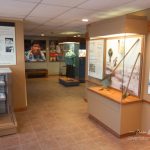
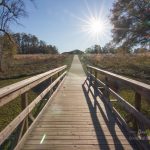
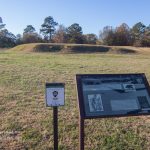
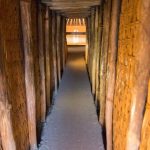
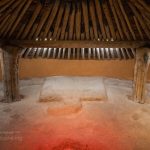
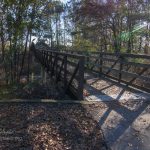
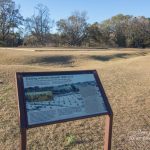
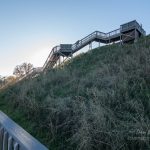
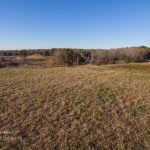
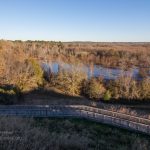
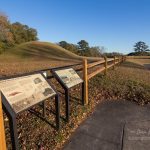
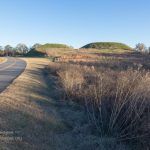
No Comments Yet